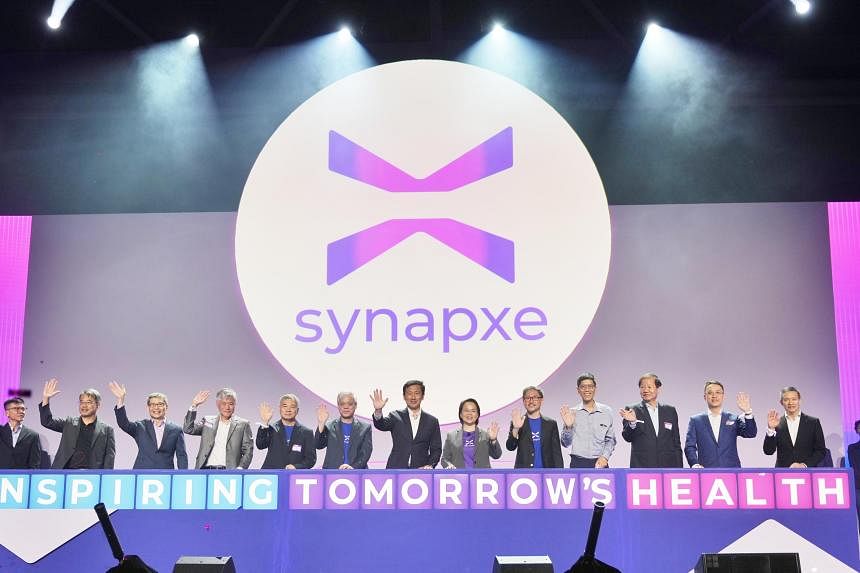Ong Ye Kung highlights 5 strategic priorities for rebranded national health tech agency Synapxe

SINGAPORE - The country’s health tech agency Integrated Health Information Systems has been rebranded as Synapxe, as its work expands in scale and scope after 15 years of supporting public healthcare institutions and partners.
At the launch of the agency’s new name at the Singapore Expo on Thursday, Health Minister Ong Ye Kung listed its five strategic priorities.
These are aligned with a shift in Singapore’s healthcare system towards preventive care and care delivery in non-hospital settings, communities and homes.
The first priority for Synapxe is to continue its work on a central digital repository for patients’ medical records.
This is the core objective of the National Electronic Health Record (NEHR) system – set up by the agency – which supports the vision of “one patient, one health record”.
“It removes the need for patients who need to see multiple doctors to bring physical files from one clinic or one hospital to another,” said Mr Ong. It solves the problem where a patient is admitted to hospital for an emergency and the hospital finds that it does not have his medical history.
The NEHR system is now used by more than 21,000 healthcare professionals and administrators every month, he said. For the public, the HealthHub app is where they can securely access their own medical records and more.
The NEHR was established in 2011. “We still have some way to go to fully integrate patients’ data. This will be resolved when and if we enact the Health Information Act next year,” said Mr Ong.
The agency’s second priority is to establish a system for remote medical consultation, which Mr Ong said will be an “important capability” as greater emphasis is placed on primary care.
He said there is potential to expand telehealth use, but this requires more work on the supporting functions.
“We need to decide on and apply our policies on Chas (Community Health Assist Scheme) subsidies, MediSave, Pioneer and Merdeka generation packages for telehealth. There needs to be a robust system of governance, regulation and enforcement in case there is any form of abuse because of telehealth,” said Mr Ong.
A national medication fulfilment system will also need to be in place. Mr Ong said Synapxe is working with the national healthcare supply chain agency to develop the National Central Fill Pharmacy (NCFP).
“For institutions like polyclinics, the NCFP aims to centralise the fulfilment of medication off-site, before it is delivered to patients,” he said.
Next comes the need for a national billing system, as there are now disparate billing systems across clusters, hospitals, public and private healthcare institutions. Mr Ong said the aim should be for a unified billing system for the public sector at least.
Strong cyber and data security is another area of focus for Synapxe. There has been a threefold increase in cyber-security measures and capabilities over the past five years, but complacency can never set in as this is a constantly evolving area, said Mr Ong.
He also touched on future possibilities, saying he believed healthcare to be on the cusp of a technological revolution.
New diagnostic techniques, coupled with wearables, can usher in a new era of preventive and personal care while generative artificial intelligence (AI) opens up a world of possibilities.
Mr Ong said that with healthcare being a sector that involves personal attention and service, and is so tightly regulated, generative AI is not likely to replace manpower in a very big way or cause a major upheaval in the sector.
Today, pattern recognition technology is used in medical imaging to recognise tumours, and health apps use AI to nudge us to adopt good eating and exercise habits. There will be more possibilities, said the minister.
Read the full story for $0.99/month
Save more than 90% on your subscription and get over 500 subscriber-only articles every month.
ST All-Digital Package - Monthly
$29.90 $0.99/month
No contract
$0.99/month for the first 3 months, $29.90/month thereafter. T&Cs apply.
Unlock these benefits
Get subscriber-only articles on ST Web and app
Easy access on up to 4 devices
2-week e-paper archive to ensure you never miss out on news that matters to you
Join ST's WhatsApp Channel and get the latest news and must-reads.









No comments:
Post a Comment